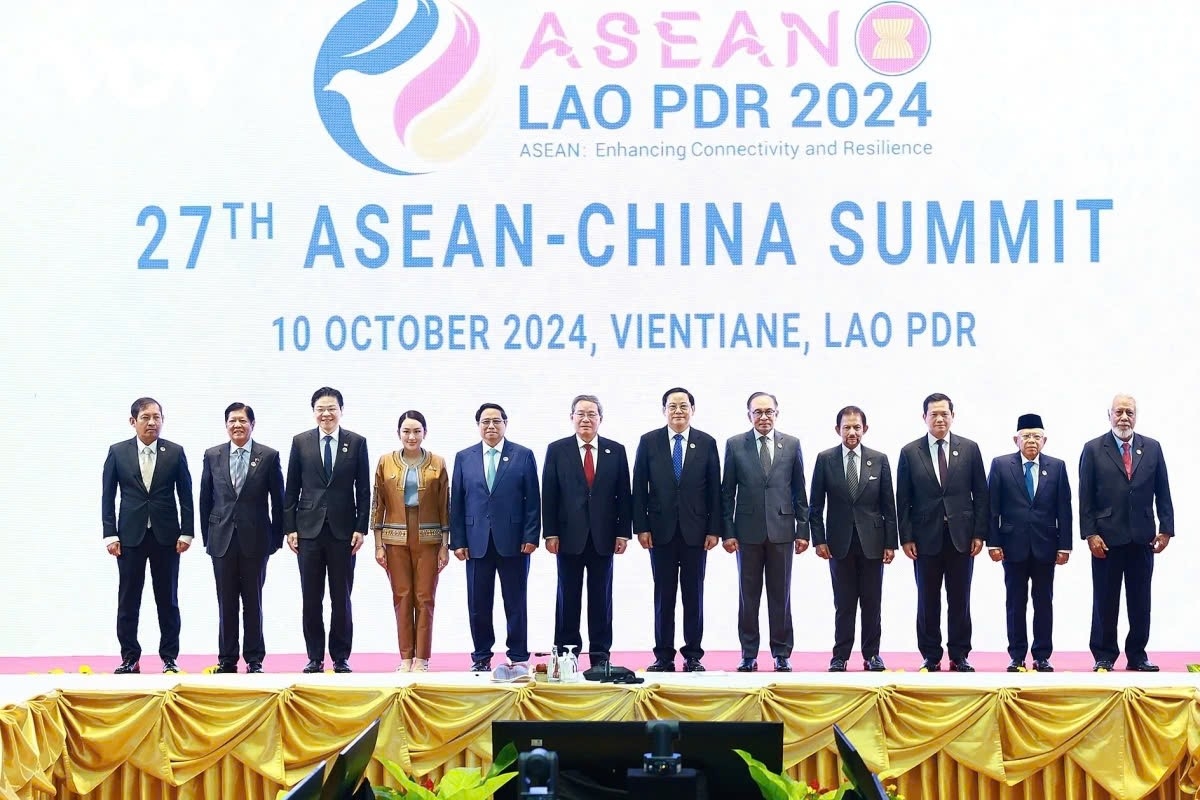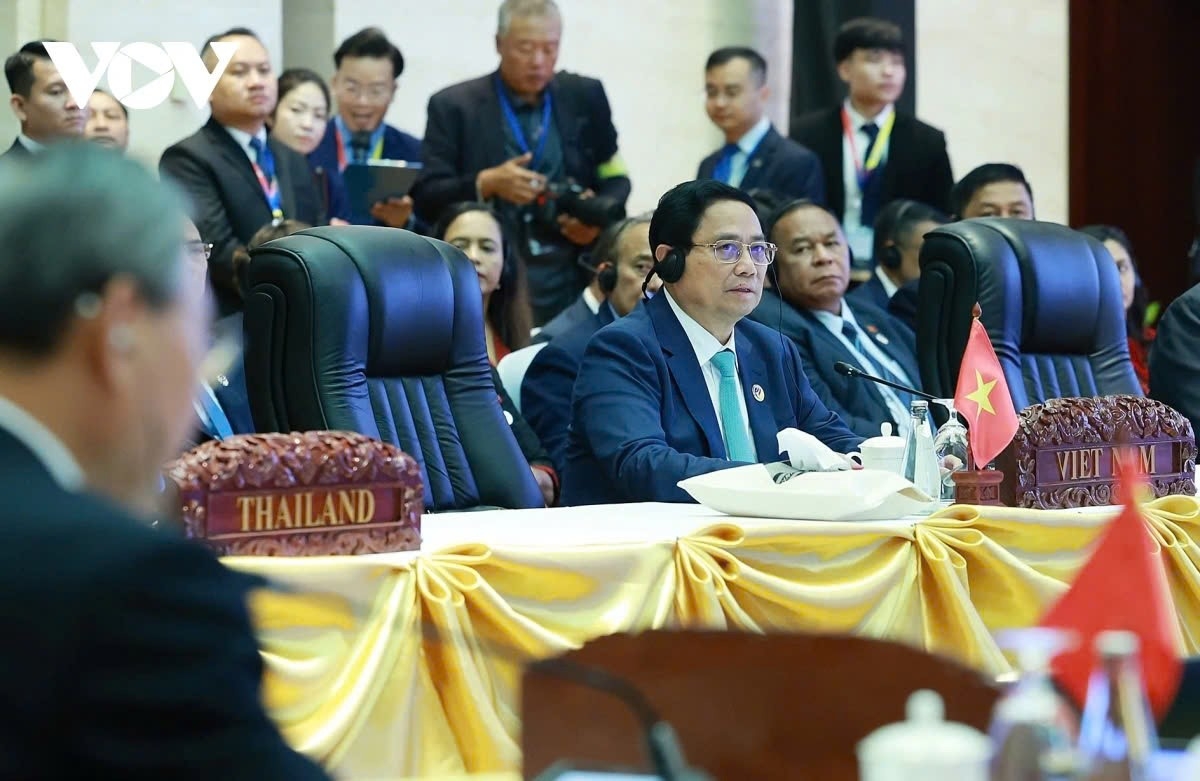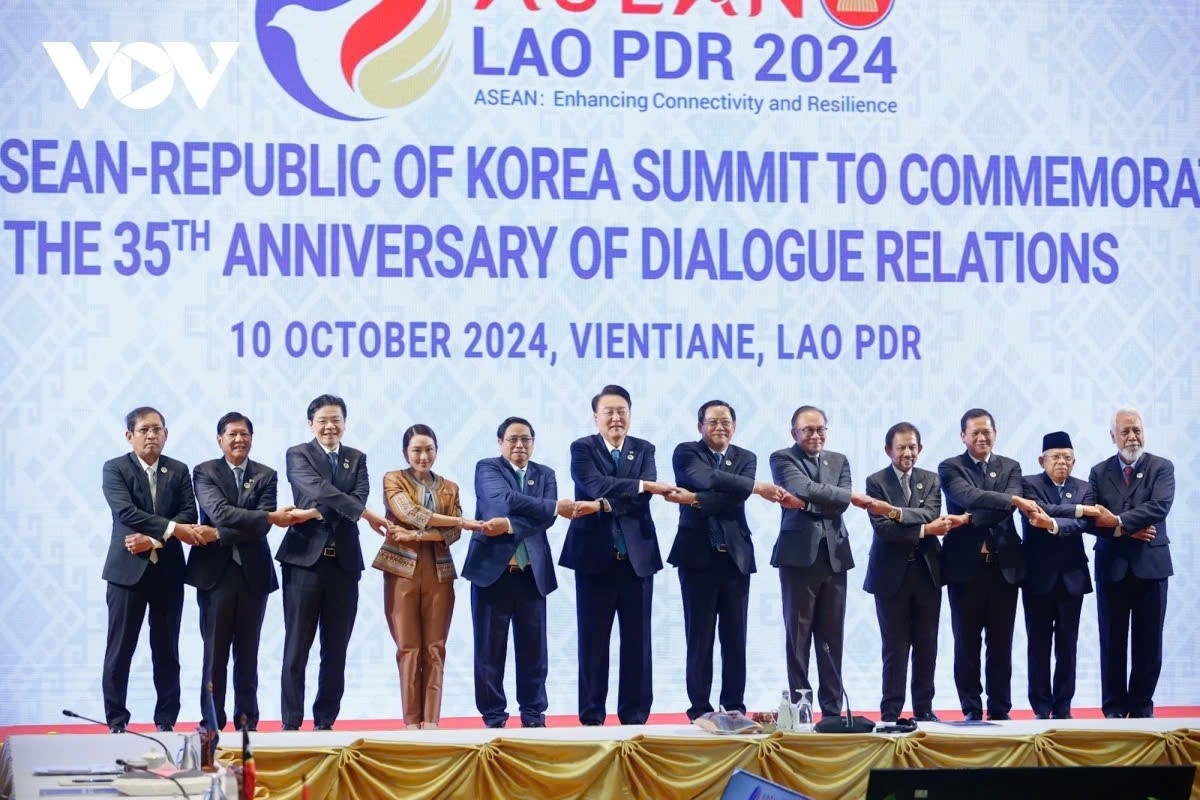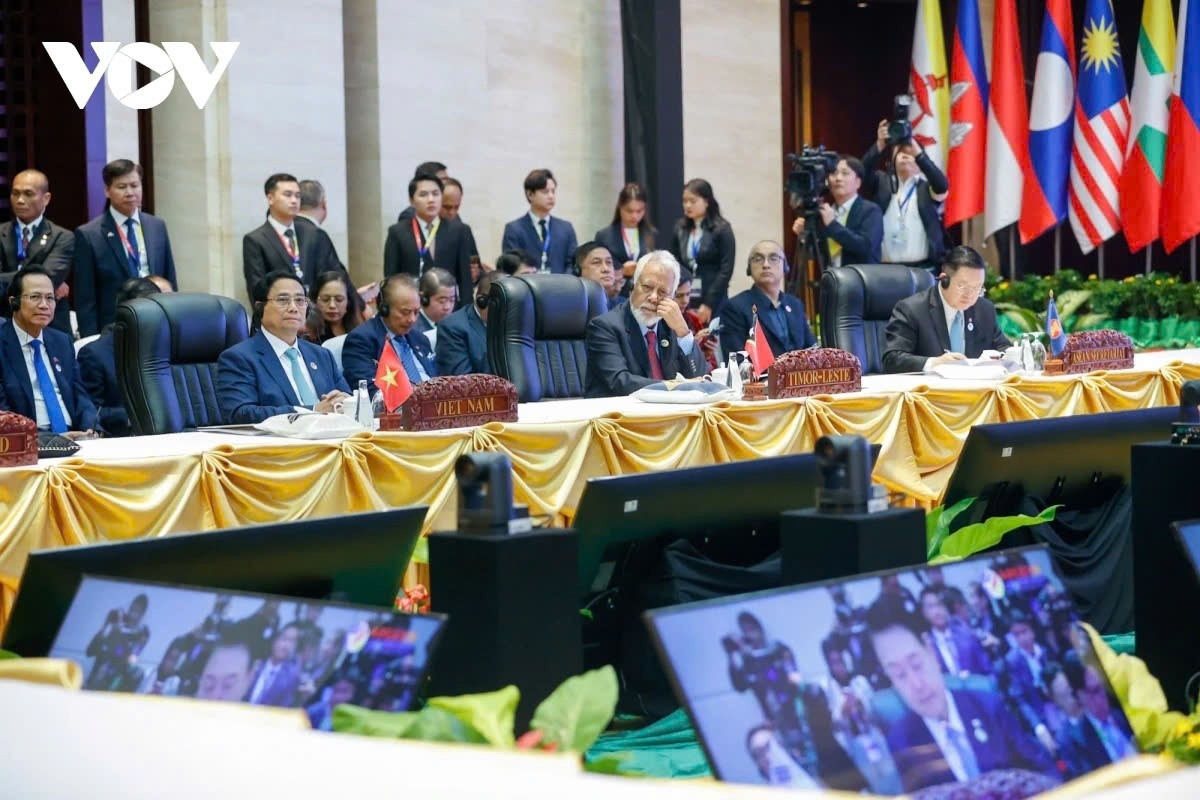Vietnam urges ASEAN and China to promote strategic connectivity at Vientiane summit
VOV.VN - Prime Minister Pham Minh Chinh of Vietnam urged ASEAN and China to promote strategic connectivity, while addressing the 27th ASEAN-China summit in Vientiane, Laos, on October 10.

Chinh welcomed the substantive, effective, and extensive development of ASEAN-China relations, bringing positive benefits to both sides. He emphasized that ASEAN and China are increasingly affirming their roles as an important driving force, a dynamic development center that leads growth and development in the region and elsewhere in the world.
Outlining directions for future relations, he proposed that ASEAN and China enhance resilience, and foster close, comprehensive, and inclusive connections, including strengthening strategic connectivity, especially in strategic infrastructure and transportation, promoting new growth drivers, facilitating smooth trade connections, and enhancing ties within the Belt and Road Initiative.
He also expected that both sides would accelerate market opening, upgrade border infrastructure, particularly in soft connectivity through smart customs, make good use of scientific and technological advancements, and boost cooperation in developing the digital economy and green economy.
Appreciating the ASEAN-China Year of People-to-People Exchanges 2024, Chinh stressed the need to further enhance people-to-people exchanges, contributing to strengthening a solid social foundation, continuously nurturing the feelings of friendly neighbours, and developing the Comprehensive Strategic Partnership between ASEAN and China.

The Prime Minister hoped that ASEAN and China would align their positions and viewpoints, further strengthen political trust, coordinate closely, and contribute positively and responsibly to peace, security, and stability. He underlined the need to enhance dialogue and peacefully resolve disputes in the region, including in the East Sea, turning the East Sea into a zone of peace, stability, cooperation, and long-term sustainable development.
He called for the substantive and effective conclusion of the Code of Conduct (COC) negotiations in accordance with international law, including the 1982 United Nations Convention on the Law of the Sea.
Speaking at the summit, Chinese Premier Li Qiang affirmed that China would continue to prioritise developing and enhancing close connections between regional economies, effectively implementing the ASEAN-China Free Trade Agreement and the Regional Comprehensive Economic Partnership (RCEP), while promoting transportation and multimodal connectivity projects to increase trade, services, tourism, and people-to-people exchanges.
He also assured that China would provide more scholarships for ASEAN students, enhance people-to-people exchanges and increase mutual understanding and trust, serving as crucial foundations for sustainable development of relations.
With regard to the East Sea issue, ASEAN and Chinese leaders affirmed the importance of ensuring peace, security, and stability in the regional waters, peacefully resolving disputes, calling for the full implementation of the Declaration on the Conduct of Parties in the East Sea (DOC), and intensifying efforts to soon achieve the Code of Conduct in the waters (COC), to transform the East Sea into a zone of peace, friendship, and cooperation.
At the end of the summit, ASEAN and Chinese leaders adopted a joint statement on deepening people-to-people cooperation, completing negotiations to upgrade the ASEAN-China Free Trade Agreement (ACFTA), developing smart agriculture, promoting the construction of a sustainable and inclusive digital ecosystem, and combating online fraud and cyber gambling.
China has been ASEAN’s largest trading partner for 15 consecutive years, with bilateral trade reaching nearly US$700 billion in 2023. It is the third largest foreign investor in ASEAN with a total capital of US$17.3 billion.

At the ASEAN-Republic of Korea Summit, the leaders agreed to adopt a joint statement on establishing a Comprehensive Strategic Partnership between ASEAN and the RoK, marking a new milestone in the celebration of 35 years of diplomatic relations (1989-2024). They emphasized that the establishment of the new partnership framework reflects the high level of cohesion and the positive results of the extensive cooperation between ASEAN and the RoK.
The RoK is currently ASEAN’s fifth largest trading partner, with bilateral trade reaching US$196.64 billion. it is also ASEAN’s sixth largest foreign investor, pouring US$11 billion into the bloc in 2023.
ASEAN and RoK leaders affirmed their resolve to closely coordinate and effectively implement the Korea- ASEAN Solidarity Initiative (KASI) to further deepen cooperation between the two sides.
Alongside cooperating to address non-traditional security challenges, enhancing trade, connecting businesses, and promoting people-to-people exchanges, both sides agreed to foster cooperation in science - technology, innovation, digital transformation, environmental issues, climate change response, and disaster management.
South Korean President Yoon Suk Yeol expressed appreciation for the significant progress in ASEAN-RoK relations over the past 35 years, noting that their total trade has increased 23 times, investment has grown 80 times, and people-to-people exchanges have risen 37 times.
The President reaffirmed the RoK’s desire to further enhance solidarity and cooperation with ASEAN countries to effectively address security, economic, and climate change challenges, and increase ASEAN investment in projects on smart cities, digital transformation, joint research, and human resource training in the fields of technology and artificial intelligence.

In his remarks, Vietnamese Prime Minister Pham Minh Chinh welcomed the establishment of the new partnership framework between ASEAN and the RoK. He also welcomed the RoK’s continued active support for ASEAN’s common stance on the East Sea, as well as efforts to build the sea into a region of peace, stability, cooperation, and sustainable development.
ASEAN is ready to collaborate and encourage relevant parties to enhance dialogue aimed at achieving long-term peace and stability on the denuclearized Korean Peninsula, he stressed.
Chinh also stressed the need to strongly promote economic cooperation, focusing on connecting economies, and enhancing cooperation in culture, tourism, and education and training. In this context, he said trade and investment cooperation should be enhanced in a more balanced and sustainable manner, making better use of the ASEAN-Korea Free Trade Agreement (AKFTA) and the Regional Comprehensive Economic Partnership (RCEP).
He expected that the two sides would step up the signing of joint documents to create a transparent and favourable cooperation mechanism, open larger markets to each other, and enhance exchanges and cooperation in culture, tourism, and education - training.
Last but not least, he said there is a need for more decisive action to promote inclusive, comprehensive growth and sustainable development, particularly concerning new growth drivers. Accordingly, it is essential to explore new strategic cooperation horizons in areas such as innovation, high technology, renewable energy, digital transformation, green transformation, climate change response, semiconductors, artificial intelligence (AI), cloud computing, and the Internet of Things.
He also suggested promoting the Mekong-RoK Partnership, contributing positively to efforts for sub-regional development, ensuring inclusive growth, narrowing gaps, and achieving sustainable development in the region.



